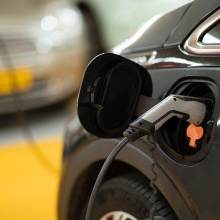Electromobility plays an essential role in driving forward the energy and mobility revolutions. However, in order to achieve the market growth we want, a charging infrastructure with the necessary size and power is required to completely support electromobility. As part of the joint project “BANULA”, the Fraunhofer IAO is carrying out research with a total of nine different partners into how charging can be made simple, transparent and accessible by using blockchain technology. From the University of Stuttgart, the Institute of Human Factors and Technology Management (IAT) and the Institute of Power Transmission and High Voltage Technology (IEH) are involved in the project.
Drivers of electric vehicles in Germany are faced with a confusing array of providers and contract models. Electric car drivers often don’t know whether a roaming connection is provided or how much it costs to charge their vehicle. Furthermore, users can’t freely choose the electricity supplier at the charging station. This makes it necessary to adjust the previous energy management-related way of accounting for charging vehicles as well as the associated responsibilities and processes. In order to enhance the customer experience and increase customer acceptance, it is not just charging the vehicles and accounting for the different costs involved which needs to be simplified; the reliability and functionality also needs to be made practical and simple as well as transparent.
This is where the “BANULA” project for accessible and user-friendly charging comes in. The aim of the project is to make sure that electric vehicles can be charged at any charging station in a way which is customer-oriented, uncomplicated and compatible across networks. With the help of blockchain technology, a decentralized medium is created which enables a secure data exchange between all participants in the electromobility ecosystem. The use of blockchain technology raises the level of the interaction between the different stakeholders involved, and can ensure a manipulation-proof way of accounting for the charging processes across all market roles which is in keeping with calibration law. In addition, AI-based controlling options ensure non-discriminatory access to charging infrastructure, transparency about charging processes in real time for network operators as well as a significant improvement in energy-management processes. The relevant stakeholders which are involved in charging an electric vehicle are all addressed here, both those in the limelight as well as those behind the scenes. The “BANULA” project brings together a varied consortium made up of nine partners* led by the Fraunhofer Institute for Industrial Engineering (IAO), and is also supported by associated partnerships.
The new project approach paves the way for uncomplicated charging across networks – anywhere, any time
The consortium comprises all the relevant energy management roles involved, including the necessary legal and research skills. As part of the project, the consortium builds on existing energy management processes to ensure a high degree of compatibility and integration capacity. The project produces added value for all market roles through the correct billing information of charging processes in real time – particularly for people operating charging stations, e-mobility providers, distribution and transmission operators and the end customers. This also provides the basis for calculating the extreme load flow based on charging processes. This is essential for using the information related to operating the network as well as for quantitatively analyzing the targeted expansion of charging infrastructure. The integration of intelligent measuring systems, so-called smart meter gateways, likewise forms part of the project, as well as testing the system as a whole with a significant test fleet of electric vehicles.
The project is planned to last for a period of three years. Due to the highly innovative nature of the contents of the project, identifying new business and operator models also makes up a core part of the work. The consortium also explicitly aims to disseminate the results to the operating business and the market. The project, which is funded by the German Federal Ministry for Economic Affairs and Energy (BMWi), has a total volume of EUR 9.2 million.
The partners involved in the project include the following:
- Fraunhofer Institute for Industrial Engineering IAO (project coordinator)
- Badenova AG & Co. KG, representing the badenova Group.
- Becker Büttner Held PartGmbB
- Fujitsu
- Institute of Human Factors and Technology Management (IAT) at the University of Stuttgart
- Institute of Power Transmission and High Voltage Technology (IEH) at the University of Stuttgart
- Parkraumgesellschaft Baden-Württemberg mbH
- Schwarz Immobilien Service GmbH & Co. KG
- smartlab Innovationsgesellschaft mbH
- TransnetBW GmbH
| Contact | Yeama Bangali, Press and Public Relations Officer IAO, Nobelstr. 12, 70569 Stuttgart, phone: +49 711 970-5196, email |
|---|
Expert Contact:
Dr. Daniel Stetter, Team Leader Smart Energy Systems, Fraunhofer IAO, Nobelstraße 12, 70569 Stuttgart, phone: +49 711 970-2371, email


